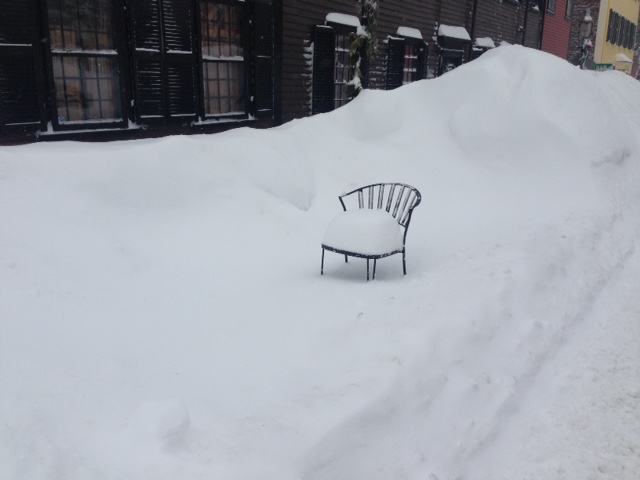
Parking space savers constitute one of the most contentious winter weather practices in Boston. In 2014 the South End Forum, an umbrella group of several neighborhood associations, outlawed the the saving of spaces in which people outfit them with placeholders. Now this year, the Forum is raising money for people whose vehicles take the brunt of people fed up with the polarizing practice.
People who spend time and energy shoveling out a small chunk of pavement – an exhausting chore when more than 80 inches of snow falls over almost three weeks – they think that by doing so, and reinforcing it with a folding chair, or an old bureau or a creepy teddy bear doll, they’ve claimed dominion over it and can fend off any parking space vultures circling the block.
But not everybody sulks away defeated when they peer around a massive snowbank and find another’s mocking car where their proof of ownership placeholder should be.
Some of the vengeful leave antagonistic notes on the windshield. Some slash tires.
To try and combat the latter, the Boston Globe reports, The South End Forum created a fund “to cover the costs of the replacement tires, and is gathering names and license plate numbers of those who continue to defy the ban so they can be reported to Boston Police.”
Multiple people have been subjected to this and the Forum is coming to the aid of its community.
“This is a criminal act of vandalism. This is not a quaint Boston custom gone awry,” Stephen Fox, cochairman of the South End Forum, told the Globe. “This is something that is intolerable in an urban environment, and it needs to be treated as a crime and not with a shoulder shrug.”
Traditionally, the practice of space saving in Boston has been honor-based in that people who dig out space can use it for about two days. Recently, with a constant bombardment of snow and high winds, it’s been more difficult for people to let go after the allotted 48 hours.
The South End is the first neighborhood to formally do away with space saving so it’ll be interesting to see if this catches on as a trend elsewhere, and if its campaign against property destruction helps deter some people from committing it by showing them that a neighborhood organization is willing to stand up against them.

